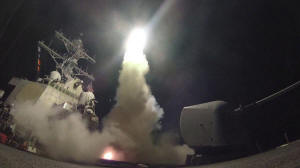|
U.S. fires missiles at Assad airbase;
Russia denounces 'aggression'
 Send a link to a friend
Send a link to a friend
 [April 07, 2017]
By Steve Holland, Andrew Osborn and Tom Perry [April 07, 2017]
By Steve Holland, Andrew Osborn and Tom Perry
PALM BEACH, Fla./MOSCOW/BEIRUT (Reuters) -
The United States fired cruise missiles on Friday at a Syrian airbase
from which President Donald Trump said a deadly chemical weapons attack
had been launched, the first direct U.S. assault on the government of
Bashar al-Assad in six years of civil war.
In the biggest foreign policy decision of his presidency so far, Trump
ordered the step his predecessor Barack Obama never took: directly
targeting Assad's military as punishment for the chemical weapons attack
which killed at least 70 people.
That catapulted the United States into a confrontation with Russia,
which has military advisers on the ground assisting its close ally
Assad.
"Years of previous attempts at changing Assadís behavior have all failed
and failed very dramatically," Trump said as he announced the attack
from his Florida resort, Mar-a-Lago, where he was meeting Chinese
President Xi Jinping.
"Even beautiful babies were cruelly murdered in this very barbaric
attack," he said of Tuesday's chemical weapons strike, which Western
countries blame on Assad's forces. "No child of God should ever suffer
such horror."

The swift action is likely to be interpreted not only as a signal to
Russia, but also to other countries such as North Korea, China and Iran
where Trump has faced foreign policy tests early in his presidency.
The Syrian army said the U.S. attack killed six people at its air base
near the city of Homs. It called the attack "blatant aggression" and
said it made the United States a "partner" of "terrorist groups"
including Islamic State. Homs Governor Talal Barazi told Reuters the
death toll was seven.
A spokesman for Russian President Vladimir Putin said the strike had
seriously damaged ties between Washington and Moscow. Putin regarded the
U.S. action as "aggression against a sovereign nation" on a "made-up
pretext", spokesman Dmitry Peskov said.
Russian television showed craters and rubble at the site of the airbase
and said nine aircraft had been destroyed.
ATTACK SAID TO BE "ONE-OFF"
U.S. officials said they had taken pains to ensure Russian troops were
not killed, warning Russian forces in advance and avoiding striking
parts of the base where Russians were present.
Western allies of the United States spoke out in support of the decision
to launch the strikes. Several countries said they were notified in
advance, but none had been asked to take part. Iran, Assad's other main
ally, denounced it.
U.S. officials described the attack as a one-off that would not lead to
wider escalation, and Syrian officials and their allies also said they
did not expect the attack to lead to an expansion of the conflict.
"No doubt this will leave great tension on the political level, but I do
not expect a military escalation. Currently I do not believe that we are
going toward a big war in the region," a senior, non-Syrian official in
the alliance fighting in support of Assad who declined to be identified
told Reuters.

For years, Washington has backed rebel groups fighting against Assad in
a complex multi-sided civil war under way since 2011 that has killed
more than 400,000 people. The war has driven half of Syrians from their
homes, creating the world's worst refugee crisis.
The United States has been conducting air strikes against Islamic State
militants who control territory in eastern and northern Syria, and a
small number of U.S. troops are on the ground assisting anti-Islamic
State militias. But until now, Washington has avoided direct
confrontation with Assad.
Russia, meanwhile, joined the war on Assad's behalf in 2015, action that
decisively turned the momentum of the conflict in the Syrian
government's favor.
Trump's decision to strike Syrian government forces is a particularly
notable shift for a leader who in the past had repeatedly said he wanted
better relations with Moscow, including to cooperate with Russia to
fight Islamic State.
However, Trump had also criticized Obama for setting a "red line"
threatening force against Assad if he used chemical weapons, only to
pull back from ordering air strikes in 2013 when Assad agreed to give up
his chemical arsenal.
Russian media long portrayed Trump as a figure who would promote closer
relations with Moscow. At home, Trump's opponents have accused him of
being too supportive of Putin.
[to top of second column] |

U.S. Navy guided-missile destroyer USS Porter (DDG 78) conducts
strike operations while in the Mediterranean Sea which U.S. Defense
Department said was a part of cruise missile strike against Syria on
April 7, 2017. Ford Williams/Courtesy U.S. Navy/Handout via REUTERS

LIMP CORPSES, CHOKING CHILDREN
On Friday, a warplane hit the town of Khan Sheikhoun where Tuesday's
chemical attack took place. An activist working at an air raid
warning service in opposition areas told Reuters it caused only
material damage.
Tuesday's attack was the first time since 2013 that Syria has been
accused of using sarin, a banned nerve agent it was meant to give up
under the Russian-brokered, U.N.-enforced deal that persuaded Obama
to call off air strikes four years ago.
The Syrian government and Moscow have denied that Syrian forces were
behind the attack, but Western countries have dismissed their
explanation - that chemicals leaked from a rebel weapons depot after
an air strike - as beyond credibility.
Video and pictures of the aftermath of Tuesday's chemical attack
were shown around the world this week, depicting limp bodies and
children choking while rescue workers hosed them down to try to wash
off the poison gas. In Russia, state television blamed rebels and
did not show footage of victims.
Tomahawk missiles were fired from the USS Porter and USS Ross around
0040 GMT, striking multiple targets - including the airstrip,
aircraft and fuel stations - on the Shayrat Air Base, which the
Pentagon says was used to store chemical weapons.
U.S. Secretary of State Rex Tillerson said the strike did not mean
the wider U.S. policy on Syria had changed.

"This clearly indicates the president is willing to take decisive
action when called for," he told reporters. "I would not in any way
attempt to extrapolate that to a change in our policy or our posture
relative to our military activities in Syria today. There has been
no change in that status."
The attack was a "one-off," a U.S. defense official told Reuters,
meaning it was expected to be a single strike with no current plans
for escalation.
"CHEMICAL WEAPONS APPALLING"
U.S. allies were strongly supportive of the U.S. strikes. French
Foreign Minister Francois Ayrault said: "The use of chemical weapons
is appalling and should be punished because it is a war crime."
Over the previous few months, many Western countries had been
quietly backing away from long-standing demands that Assad leave
power, accepting that rebels no longer had the power to remove him
by force. But after the chemical weapons attack on Tuesday, several
countries said Assad must go.
Among the countries strongly backing the strikes and calling for
Assad to be removed from power was Turkey. Long one of Assad's
principal foes, Turkey had in recent months reached a rapprochement
with Russia and had been co-sponsoring Syrian peace talks with
Moscow; its change of tone could make it harder for Russia to put
forward a peace plan that would keep Assad.
The attacks spurred a flight to safety in global financial markets,
sending yields on safe-haven U.S. Treasury securities to their
lowest since November. Stocks weakened in Asia and U.S. equity index
futures slid, indicating Wall Street would open lower on Friday.
Prices for oil and gold both rose, and the dollar slipped against
the Japanese yen.

(Additional reporting by Phil Stewart, Idrees Ali, Yara Bayoumy,
Jonathan Landay, John Walcott, Lesley Wroughton, Patricia Zengerle,
Roberta Rampton, David Brunnstrom and Matt Spetalnick in Washington,
Megan Davies in New York and Jack Stubbs in Moscow; Writing by Peter
Graff, editing by Peter Millership)
[© 2017 Thomson Reuters. All rights
reserved.]
Copyright 2017 Reuters. All rights reserved. This material may not be published,
broadcast, rewritten or redistributed. |